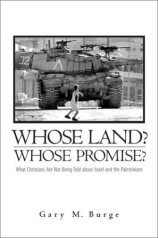 Whose
Whose
Paternoster, 286 pages, £14.99 hb.
ISBN 1-84227-232-2
I
can count on one hand the number of evangelical leaders willing and able to write
a book like this and know of even fewer evangelical publishers willing to print
it.
The
purpose of the book is summed up in the sub-title, ‘What Christians are not being
told about
Based on these prophetic warnings, Burge faces head on the evidence that would lead us to fear another Jewish exile from the land - the theft of land and water, the destruction of hundreds of Palestinian villages, the illegal settlements, the daily human rights abuses, closures, arrests, detentions, torture and deportations - which the wider church and Jewish community largely chooses to ignore to their shame.
We
are also introduced to many of the Christian leaders of the
Burge has been vilified for his views and accused by the Anti-Defamation League of being anti-Semitic. I take this as a sign instead of his theological integrity and faithfulness to the Lord Jesus Christ. He shows that it is indeed possible to be pro-Israeli and pro-Palestinian without being either Zionist or anti-Semitic. I commend this rare and important book unreservedly.
A criticism? We need a cheaper paperback please Paternoster, and quickly.
Stephen Sizer
400 words